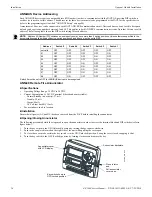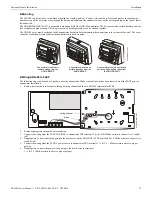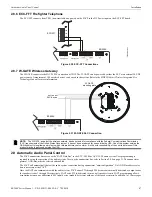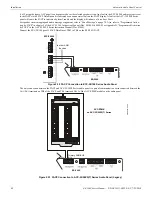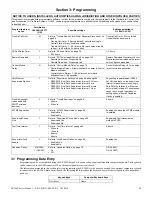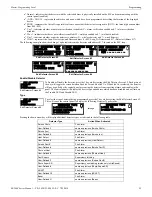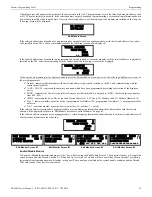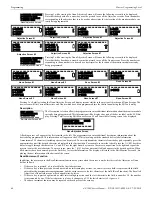
ES-200X Series Manual —
P/N LS10131-000FL-E:C 7/25/2018
49
Section 3: Programming
3.1 Programming Data Entry
Programming can be accomplished using the ES-200X keypad or by connecting an optional standard computer keyboard. The keyboard
can be connected to the USB connector J20 on the control panel main circuit board.
The information presented in this section refers to programming the ES-200X via the onboard keypad. If an optional computer keyboard
is connected to the ES-200X main circuit board, the following table describes the keyboard keys which correspond to the onboard key-
pad keys.
NOTICE TO USERS, INSTALLERS, AUTHORITIES HAVING JURISDICTION AND OTHER INVOLVED PARTIES
This product incorporates field-programmable software. In order for the product to comply with the requirements in the Standard for Control Units
and Accessories for Fire Alarm Systems, UL 864, certain programming features or options must be limited to specific values or not used at all as
indicated below:
Program feature or
option
Permitted in
UL864/ULC527?
(Y/N)
Possible settings
Settings permitted in
UL 864 / ULC527
Trouble Call Limit
N
Refer to “Trouble Report Limit (Dialer Runaway Prevention)” on
page 86.
• Trouble Call Limit = 0 (factory default): unlimited calling to
Central Station for any trouble condition
• Trouble Call Limit = 1 - 99: limits call for each unique trouble
to from 1 to 99 within a 24 hour period
Trouble Call Limit = 0 for unlimited
Central Station trouble calls
AC Fail Delay Timer
Y
Refer to “AC Loss Delay” on page 75.
• 0-23 hours
1-3 hours
Remote Download
Y
Refer to “FS-Tools Upload/Download” on page 123.
• Remote Download - Proprietary No
• Remote Download - Proprietary Yes
Remote Download
Proprietary Yes
for
Proprietary system intended to protect
only contiguous properties
Control Module
Delay
N
Refer to “Control Module Delay” on page 75.
• Control Module Delay = 0 (factory default): no delay in Control
Module activation
• Control Module Delay = 1-180: delays control module
activation from 1-180 seconds
Control Module Delay = 0 for no delay
in control module activation
Cell/Ethernet
Supervision Options
Y
Refer to “Supervision Settings” on page 86 and page 86
• NFPA 2010 Dual Path: Supervision Interval: 24 Hours
• NFPA 2010 Sole Path: Supervision Interval: 5 min
• NFPA 2013 Dual Path: Supervision Interval: 6 Hours
• NFPA 2013 Sole Path: Supervision Interval: 1 Hour
Any setting is permitted per UL864.
For ULC applications, the supervision
interval for panels communicating in
Sole Path (Cellular-only or Ethernet-
only method) is fixed at 3 minutes and
cannot be changed, regardless of
setting option, when the Canadian
Option is enabled.
Trouble Reminder
(when used with
SWIFT wireless
devices)
Y
Refer to “Trouble Reminder” on page 80
• 4 hours
• 24 hours
4 hours
4XTMF Supervision
Y
Refer to “4XTMF Supervision” on page 80.
• Enabled Yes
• Enabled No
Enabled Yes when the 4XTMF module
is installed.
Supervised Phone
Line
Y
Refer to “Supervised Phone Line” on page 82.
• Supervised Yes
• Supervised No
Supervised Yes if transmission
method is POTS.
Test Time Interval
Y
Refer to “Test Time Interval” on page 85.
• 24 hours
• 12 hours
• 8 hours
• 6 hours
6 hours
Annunciator Lock
Enable
Y
Refer to “Lock Enable Option” on page 99.
• Enabled Yes
• Enabled No
Enabled Yes
Canadian Option
N (UL864)
Y (ULC527)
Refer to “Canadian Option” on page 79.
• On
• Off
Off (UL864)
On (ULC527)
Keypad Keys
Computer Keyboard Keys
First Event
Home


